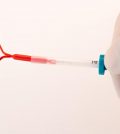- Listeria Danger Spurs Nationwide Recall of Frozen Waffles
- Washington Becomes 6th State to Report Bird Flu in Humans
- Seniors Who Split: Rates of ‘Gray Divorce’ Have Tripled Since 1990
- Black Patients 22% More Likely to Die After Bypass Surgeries
- Cataract Surgery Could Save Your Eyesight and Maybe Your Life
- Could Caffeine in Pregnancy Help Prevent Cerebral Palsy in Kids?
- Fatal Opioid-Meth Overdoses Have Fallen in U.S. by More Than a Third
- At-Home Brain Stimulation Treatment Can Safely Ease Depression
- Even Hardcore Smokers May Quit If Given Right Tools, Study Finds
- Light Therapy Might Help Ease ‘Dry’ Form of Macular Degeneration
Health Highlights: Aug. 26, 2013


Here are some of the latest health and medical news developments, compiled by the editors of HealthDay:
Music Star Linda Ronstadt Has Parkinson’s Disease
Singer Linda Ronstadt, a music star for more than four decades, has been diagnosed with Parkinson’s disease, which has robbed her of the ability to sing.
“No one can sing with Parkinson’s disease,” the 67-year-old Ronstadt said in an interview with AARP Magazine. “No matter how hard you try.”
Ronstadt said she was diagnosed eight months ago and “can’t sing a note.” She said she initially experienced symptoms about eight years ago, but thought her singing problems were caused by a tick disease, the Associated Press reported.
She said she was “completely shocked” when a neurologist diagnosed her with Parkinson’s disease. “I wouldn’t have suspected that in a million, billion years.”
Ronstadt sold tens of millions of records starting in the late 1960s. Some of her earlier hits included “You’re No Good” and “When Will I Be Loved.” She later sang pop standards and mariachi music, the AP reported.
Ronstadt now uses poles to walk on uneven ground and a wheelchair when traveling, the AARP story said.
The U.S. National Institute of Neurological Disorders and Stroke says Parkinson’s disease is part of a group of conditions called motor system disorders that are caused by the loss of certain key brain cells. Typical symptoms include tremors, or trembling in the hands, arms, legs, jaw, and face; stiffness of the limbs and trunk; slowness of movement; and problems with balance and coordination. As symptoms become more severe, some patients may have trouble with walking, talking or other simple tasks. The disease usually affects people 50 and older.
There’s no cure for Parkinson’s, but a variety of medications can provide significant relief from the symptoms, according to the institute.
—–
Florida Boy Dies From Brain-Eating Amoeba
Zachary Reyna, a 12-year-old Florida boy infected with a rare but lethal brain-eating amoeba, has died, CNN reported.
Reyna is thought to have contracted an infection with the water-borne Naegleria fowleri amoeba on Aug. 3 while kneeboarding in a water-filled ditch near his house in LaBelle, Fla. His infection quickly developed into primary amoebic meningoencephalitis (PAM), a brain condition that is nearly always fatal.
“This infection is one of the most severe infections that we know of,” Dr. Dirk Haselow of the Arkansas Department of Health told CNN affiliate WMC. “Ninety-nine percent of people who get it die.”
Reyna was hospitalized and underwent brain surgery to treat PAM, and he was also given an experimental drug used to fight the rare amoeba. But a post placed Saturday on a Facebook page that has provided updates on the case announced the boy’s death. His organs will be donated to help others, the website noted. “Even though Zac has passed, he will still be saving many lives,” the post said.
N. fowleri is rare but can be found in warm freshwater, most often in the southeastern area of the United States, according to the U.S. Centers for Disease Control and Prevention. It enters the body through the nose and travels to the brain. N. fowleri cannot be transmitted by drinking contaminated water.
Another 12-year-old, Kali Hardig, was infected with N. fowleri this summer but has survived after being treated with the same experimental drug that Reyna received, CNN said. The Arkansas girl is only the third person to survive infection with the amoeba over the past 50 years.
—–
Girl Who Got 2 Lung Transplants Is Off Oxygen
The 10-year-old Pennsylvania girl whose lung transplant sparked a national debate over organ transplantation policy is off oxygen and doing well, the Associated Press reported.
Sarah Murnaghan of Newtown Square, Penn., has end-stage cystic fibrosis and received two transplants of adult-sized lungs, even though current organ transplant policy states that children only receive child-sized lungs.
However, Murnaghan’s parents took her case to the courts. A federal judge intervened on her behalf, ordering that Sarah be allowed an adult lung transplant.
The first set of adult lungs the child received failed within hours of transplant, but a second set, transplanted three days later, seem to have worked.
Sarah’s mother, Janet Murnaghan, told the AP that the girl has been taken off oxygen but does get some breathing support from a machine. She is now able to walk around the hospital using a walker, and has gone outside for brief periods.
Copyright © 2024 HealthDay. All rights reserved.










